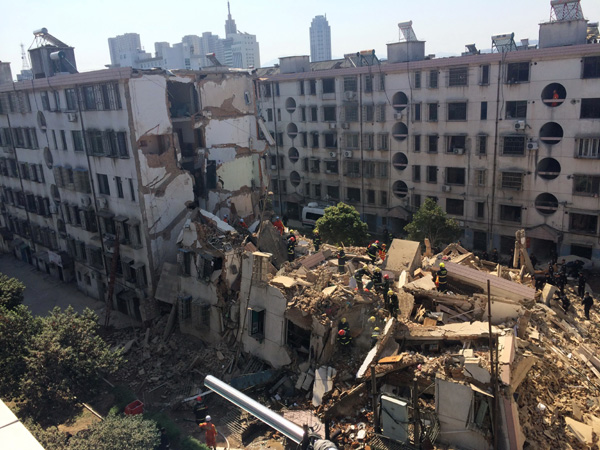An accident waiting to happen
Updated: 2014-04-17 08:15
By Yan Yiqi (China Daily)
|
|||||||||
|
 |
|
The remains of the building in Fenghua, Zhejiang province, which collapsed on April 4, causing one death and a number of serious injuries. Yan Jie / For China Daily |
The recent collapse of an apartment block in eastern China has highlighted a problem that could have fatal consequences for owners of buildings erected in the 1980s and '90s, as Yan Yiqi reports from Hangzhou.
Shen Dailu should have spent April 8 celebrating her 20th birthday in the company of family and friends. Instead, the young women from Fenghua in Zhejiang province spent the day in the hospital after the building in which she lived with her grandparents collapsed on April 4.
Her grandmother, with whom Shen had lived since her parents died when she was an infant, was killed in the collapse, and Shen's left leg was so seriously injured that it had to be amputated. Her grandfather was the only member of the family to escape unscathed, but only because he was out taking a walk when the 20-year-old building crumbled to the ground.
Four of Shen's neighbors were also injured in the collapse, and two of them remain in serious conditions in the hospital.
However, the collapse wasn't due to external forces, such as an earthquake or typhoon, but to poor construction techniques and the use of inferior building materials.
Erected in July 1994, the apartment block, which has now been demolished, was among the first batches of commercial housing built in the city - however, it wasn't the first from the period to suffer structural problems.
In 2009, a 22-year-old building, not far from the one in which Shen's family lived, collapsed. Fortunately, there were no injuries or fatalities because the residents had already been evacuated. In 2012, two people were killed when a 23-year-old building collapsed in Zhejiang city of Ningbo.
Further afield, 17 people died when a building in Hebei province constructed in the late 1980s fell down after heavy rainfall undermined its structural integrity.
Officially, the lifespan of residential buildings of this type is between 50 years to 100 years, but the poor quality of the apartment blocks built during the construction boom that accompanied China's reform and opening-up policy in the late 1970s is now becoming a matter of national concern.
Low standards
Yang Bingde, a professor at Zhejiang University's College of Civil Engineering and Architecture, said that during the 1980s and '90s, the development of China's commercial housing sector far outstripped economic progress, a fact that led directly to the problems that are now emerging.
"At the time, the market economy had just been put in place and the standards in many industries were low. However, the country urgently needed to improve the housing situation for the growing numbers of new city dwellers," he said.
As urbanization quickened and cities expanded or were built from scratch, the average living space for residents grew rapidly, from 7.2 square meters in 1980 to 20.3 sq m in 2000.
"The (construction) industry was developing so quickly that many of the workers had no time to acquire the necessary knowledge and experience. In the meantime, poor building techniques and limited funding meant the quality of this sort of housing was hard to guarantee," said Yang, who added that construction quality wasn't a top priority for the developers.
"All they thought about was how to construct the buildings and sell them as quickly as possible," he said.

 US 'wants China's to succeed in its reforms'
US 'wants China's to succeed in its reforms'
 Silver surfer has ridden waves for six decades
Silver surfer has ridden waves for six decades
 China's CITIC acquires stake in NY brokerage firm BTIG
China's CITIC acquires stake in NY brokerage firm BTIG
 British royal family's last day in NZ
British royal family's last day in NZ
 Boston shows its heart on bombing anniversary
Boston shows its heart on bombing anniversary
 Xi: Integrate space and air roles
Xi: Integrate space and air roles
 China certifies Sikorsky S-76D helicopter for 'growing' market
China certifies Sikorsky S-76D helicopter for 'growing' market
 Museum of 'House upside down' opens in Russia
Museum of 'House upside down' opens in Russia
Most Viewed
Editor's Picks

|

|

|

|

|

|
Today's Top News
US Treasury declines to name China as currency manipulator
Solar power surging in Latin America with World Cup fever
Internet recruiter aims for base of millions
US schools still draw Chinese
China's CITIC acquires stake in NY brokerage firm BTIG
Chinese automakers pass on New York auto show
China sells more of its US debt in Feb: Treasury
Tesla in search of deal with Sinopec
US Weekly

|

|








